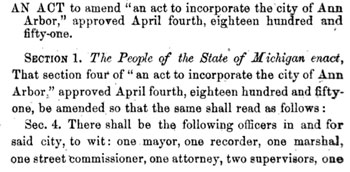Column: Time for Non-Partisan Elections
At a recent forum for Democratic primary candidates for the Ann Arbor city council, Ward 5 incumbent Mike Anglin expressed a generally positive outlook about the direction the council and the city are headed. But Anglin did not have praise for the level of participation in primary elections: “Our turnout in a primary election is devastatingly low. It’s embarrassingly low. And our community cannot be proud of that at all.”

This graphic was poached from a column written for The Chronicle last year by former city attorney Bruce Laidlaw – advocating for non-partisan elections. Laidlaw’s argument was based in part on the idea that it reduces the potential for lame ducks. It might also encourage more competition and participation. (Image links to Laidlaw’s column.)
How bad is it? The August 2012 Democratic primary featured contested races in four of the city’s five wards – with voter turnout ranging from a high of 13.9% in Ward 5 to a low of 8.2% in Ward 1.
In Wards 1 and 4, the winner received less than 1,000 votes. That compared to a citywide turnout of 56.2% in the November 2012 mayor’s race.
What about the Republican primary? If you’re not familiar with Ann Arbor politics, that’s a punch line.
Only in Ward 5 did voters have a choice of city council candidates in November 2012 – Republican Stuart Berry or Democrat Chuck Warpehoski. And 62% of the ward’s voters turned out to choose Warpehoski – by a wide margin. In the other wards, the decision had already been made – in August, by fewer than 10% of registered voters in those wards. In Ward 3, no candidate stepped forward as an alternative to incumbent Democrat Christopher Taylor, in either the primary or the general election.
While Anglin recently lamented the lack of participation in the Democratic primary, I don’t think that exhorting residents to vote on Aug. 6 is likely to bump participation to anywhere near the level we might see in November. So the decisions about who represents Ann Arbor residents on the city council will likely again this year be made when less of the electorate will head to the polls – in August, not November.
But Ward 2 will be a definite exception. That’s because voters will choose between two formidable candidates in November: Democrat Kirk Westphal (unopposed in the primary) and incumbent Jane Lumm, who’s indicated she’ll again be campaigning as an independent. They might be joined by independent Conrad Brown, if he submits enough signatures by the August deadline. Still, in Ward 2, there’s no question the choice will be made in November, not August.
In Wards 1, 3 and 4, other independent candidates affiliated with a University of Michigan student group calling itself the Mixed Use Party have taken out petitions. None have yet filed the required signatures. But to the extent they prove to be serious candidates, voters in those wards might also feel they were offered a legitimate choice in November.
But when three legitimate candidates take out petitions, why are we forcing a selection between just two of them – precisely at a time of year when few voters turn up at the polls to make that selection?
Take Ward 3 as an example. Julie Grand, current chair of the city’s park advisory commission, and incumbent Democrat Stephen Kunselman are solid choices. They’ll be offered to voters in August. Only one will advance to the November general election. And as voters get to know him, independent Sam DeVarti – if he files his nominating petitions – could also prove to be another solid choice in November.
If they’re all three credible candidates, I think a more rational approach to an August primary would be to use that initial election to winnow the field of all three (or more) candidates down to two. That way the important choice, between the two finalists, would come in November, when more voters participate. Or all the candidates could be offered to voters in November, with no primary election at all.
It’s fairly common now for a city council election to draw only two candidates, both Democrats, who compete in August. If there’s no other candidate in the race at all, it would be more rational to offer those same two candidates to voters in November, when many more voters participate.
That kind of rational approach to candidate choice would be possible if Ann Arbor city council elections were non-partisan.
But under the city charter, Ann Arbor city council elections are conducted on a partisan basis.
Last year around this time, former city attorney Bruce Laidlaw wrote two op-eds for The Chronicle, the first explaining the historical background for Ann Arbor’s partisan system, and the second making a case for changing the city charter to provide for non-partisan elections.
There seems to be at least some interest this year in moving the idea forward. One indication came in a response to a recent Ward 2 resident satisfaction survey. An open-ended question asked respondents to identify the one issue that councilmembers should focus on in the next six months. Among the question’s many responses was this one: “Implement a non-partisan election process for city council and mayor.”
A question about non-partisan elections also was posed this week to Ann Arbor mayor John Hieftje, who spoke at a Rotary Club lunch. [Full Story]




